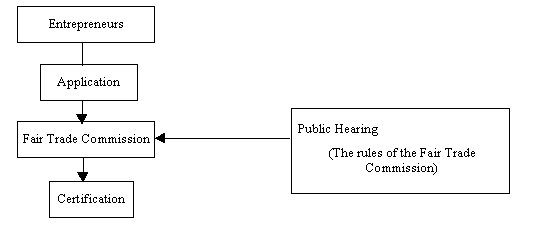The objective of this act is to prevent inducement of customers by means of unjustifiable premiums or misleading representation in connection with transactions of commodities or services. By establishing special provisions in the Act Concerning Prohibition of Private Monopolization and Maintenance of Fair Trade (Act No. 54 of 1947), fair competition is secured and thereby the interests of consumers are generally protected.
(2) OUTLINE OF THE ACT AND SYSTEM
The term "premium" as used in this Act shall mean any article, money or other kind of economic benefit provided as an means of inducement of customers, regardless of methods by entrepreneurs to other parties in connection with a transaction involving a commodity or service (Article 2-1).
The Act prohibits the providing of exaggerated premiums (Article 3).
The term "representation" as used in this Act shall mean advertisements or any other description an entrepreneur makes or utilizes as means of inducement of customers with respect to the commodity or service which he/she supplies, the terms of sale, or any other matter associated with the transaction (Article 2-2).
No entrepreneur shall make a representation through which the quality, standards or any other matter associated with a commodity or service will be generally misunderstood by consumers to be much better or much more favorable than the actual item or that of other competitors, and thereby likely to induce customers unjustly and impede fair competition (Article 4).
(3) CABINET ORDER AND MINISTERIAL ORDINANCES
None (regulations and operation standards, etc. can be referred)
(4) OUTLINE OF THE CONTROL
1) Items Covered
Premiums:
"Goods (including real estate)" "negotiable securities such as money", "entertainment" and "facility, labor and other service" provided as an means of inducement of customers in connection with a transaction
Representation:
Advertisements and other representation by means of "commodities, containers or packages and attached goods", "samples, leaflets, pamphlets, explanatory documentation and word of mouth", "posters, signboards, neon signs, advertising balloons, displays and demonstrative presentations", "publications such as newspapers and magazines, broadcasting, projection, theatrical performances and electric lights" and "data processing equipment" made or utilized as means of incentive to customers with respect to the commodity or service which he/she supplies, the terms of sale, or any other matter associated with the transaction.
2) Outline of Specifications, Standards and Inspections, etc.
i. Authorization of fair competition codes (Article 12)
Entrepreneurs or a trade association may conclude or establish an agreement of a code in order to prevent unjust inducement of customers and to ensure fair competition by obtaining approval from the Fair Trade Commission with respect to premiums or representations (Article 12).
Flowchart of Certification

ii. Cease and desist order
The Fair Trade Commission may, in the even there is an act violating the restriction or prohibition under the provisions of Article 3 or prohibition under the provisions of Article 4, order the entrepreneur concerned to cease such an act, or take the measures necessary to prevent the resurgence of the said act, or to take any other necessary measures including publicizing the matters relating to the implementation of such measure (Article 6).
When a prefectural governor finds that the action of an entrepreneur violates restrictions, prohibitions (Article 3) or the provisions of Article 4, he or she may instruct the said entrepreneur to cease and desist such action or publicize matters related to the said effect (Article 7).
Furthermore, a prefectural governor may, in case where the entrepreneur concerned does not comply with the instruction or in case where a prefectural governor finds it necessary in order to put an end to any violation, request the Fair Trade Commission to take appropriate measures in accordance with the provisions of the Act (Article 8).
(5) HIGHLIGHTS OF THE RECENT AMENDMENT
In November 2003, the Act to amend Act against Unjustifiable Premiums and Misleading Representations modified the following points.
1) Effective regulation to the misleading representation of extreme good quality without reasonable grounds
In case of any representation by which the quality, standard or any other matter relating to the substance of a commodity or service are shown to consumers in general to be much better than the actual one (Article 4-1(i)), may, where it finds it necessary in order to evaluate whether any representation constitutes, require to submit data as reasonable grounds for the representation he makes. In such cases of failure to submit the data, the representation concerned shall be deemed to fall under misleading presentation (Article 4-2).
2) Enhancement of the enforcement by prefectural governors
A prefectural governor may instruct to take the measures necessary to prevent the resurgence of such violation. Also, violation already ceased to occur is included in the coverage of governor's instruction (Article 7).
In addition, maximum penalty fine is increased from 30,000 yen to 500,000 yen (Article 16).
3) Improvement of procedural provisions
Instead of the publication system of the cease and desist order, delivery of an authorized transcript of "a written cease and desist order" was introduced (Article 6-2). In addition, as for the delivery of the cease and desist order, related provisions of the Antimonopoly Act would be applied correspondingly (Article 6-2).
(6) REFERENCE INFORMATION
(Liaison Office for Further Information)
Fair Trade Commission
Tel: 03-3581-5471 http://www.jftc.go.jp/